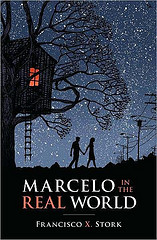
I was skeptical when I started Marcelo in the Real World by Francesco X. Stork. It seems that his knowledge of his subject -- a person on the autism spectrum -- stems from spending about a year working part-time with people with what we now euphemistically call "special needs." This included individuals who probably had Asperger's Syndrome, though that diagnosis wasn't added to the DSM until 1994. How could this author, a Boston attorney, have the understanding to create a rich, convincing portrait of a young man with Asperger's? However, I was pleasantly surprised.
The protagonist, Marcelo, is 17 and almost ready to start his senior year of high school. His father's income as founding partner of a law firm has provided the opportunity to attend Paterson, an excellent school for individuals with disabilities. There, he has been accepted for who he is and allowed as much time as he needs to process what's going on in his environment and finish tasks. This is the one place where Marcelo isn't rushed.
Like Christopher Boone, the Aspergian protagonist of The Curious Incident of the Dog in the Night-Time by Mark Haddon, Marcelo has a special interest. While Christopher's passion is math, Marcelo is fascinated with God and religion. His family is Catholic, and he enjoys praying the Rosary. He also delves into the holy books of different religions, and his mother arranges for him to have regular discussions with a rabbi. This is not a pervasive interest that lends itself to static thinking -- he is not memorizing train schedules or sports scores. He is exploring abstract ideas, like Man's relationship to God and the experience of prayer.
When Marcelo finishes his junior year of high school, his father decides he needs to come out of the protected environment of Paterson and learn to cope with the "real world." This involves a summer job with his father's law firm, which is a bit like being thrown into a viper pit. While Marcelo asks his rabbi friend questions like "Why were Adam and Eve ashamed, after eating from the Tree of Knowledge, when they realized they were naked?" he experiences his own journey from innocence to knowledge. He is facing human evil in various forms. And he has to make some very difficult decisions.
As we watch Marcelo leave the Garden of Eden, we also see him struggle with various decisions -- large and small. He is no longer in a static world where tasks are clearly laid out, he gets as much time as he needs, and right answers are usually clear. He has to decide whether a task merits being done at a slow, meticulous pace or if it has to be done quickly. He has to "read" people who are not being straightforward about what they mean. He has to improvise. He is learning what the best autism therapies try to teach -- to "read" people and situations, adapt, solve problems, and make choices. Part of this is deciding how to respond to unethical behavior, even on the part of his own father. When his dad puts Marcelo in the "real world," he gets more than he bargained for.
I found Marcelo to be a multi-layered, believable character with a compelling story. There are many layers of truth in this novel, from how people with neurological differences learn to the role of faith in human life and the nature of good and evil. It's definitely a book I won't forget.
While I recommend this novel to all readers, especially young adults, it might have particular interest for teens on the autism spectrum. It could stimulate discussion about the particular gifts and challenges they face, relationships, and how they feel about their differences.
Check Out this Great Review of this Book: Marcello and the Real World at the YA YA YAs
And This Fascinating Post
Rating: 4.5
| 5- Cherished Favorite | 4 - Keep in My Library | 3 - Good Read | 2 - Meh | 1 - Definitely Not For Me |

